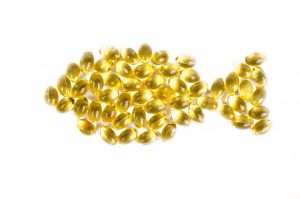The word “essential” is pretty serious. It indicates something mandatory, necessary, and survivalist. Yet, when it comes to essential fatty acids like Omega-3s, the human body is incapable of producing a supply, and many people don’t bother to make sure they have enough. Unless you’re eating salmon, sardines, and halibut on a regular basis, there’s a good chance you’re running low. Considering that omega-3 fatty acid deficiency is one of the top 10 preventable causes of death in America, you’re going to want start stocking up. Fortunately, there’s fish oil.
What is Fish Oil?
Derived from the tissue of cold-water fish, fish oil contains essential omega-3 fatty acids, including eicosapentaenoic acid (EPA) and docosahexaenoic acid (DHA). Don’t worry…you’re not expected to fry up some fish and collect the fragrant remainders from the pan. While it’s certainly ideal to get your omega-3s directly from the source, fish oil can be found in supplements for ease and convenience—and less identifiable breath.
If you haven’t incorporated fish oil in your diet, science says you should. Studies show that fish oil can potentially prevent strokes and heart attacks, reduce inflammation, help with anxiety, depression, and ADHD, and alleviate dry skin or eczema. The benefits are so compelling, in fact, that the American Heart Association (AHA) now recommends eating at least two servings of fish (particularly fatty fish) per week. That’s not always possible in our on-the-go world (and impossible for vegetarians and anyone with an allergy), so, how can you be sure you’re getting the most out of your fish oil supplement?
Choose the right form of fish oil.
It’s true that fish oil is packed with EPA and DHA, but the ratios vary depending on which type you choose. Children, and women who are pregnant or breast feeding do best with a higher DHA form, which supports brain development. Adult men and women, should choose a higher EPA form (greater than 50% concentration) for the anti-inflammatory benefits. You can measure your inflammation with a simple blood test but getting your dose of EPA can help regardless.
Get the right type for your dosage.
Depending on your health condition, you may need more fish oil than the general population. If you’ve have a history of certain cardiac problems, for instance, the AHA recommends having upward of 4 g/day. Capsules are great at lower dosages, but liquid is better and easier for these higher dosage demands. Also, if you go with capsules and find you’re burping up fish oil, look for enteric-capsules which prevent this by slowing the breakdown.
Use it long term.
Sadly, you won’t reap the benefits of fish oil overnight—it’s going to take a long-term commitment. Fish oil works by slowly incorporating the fat from the oil into your body’s cellular membrane, making it nice and flexible. This improves the health of the cell membrane, preventing inflammation and potentially increasing overall hormone function. But it takes time for this healthy change in membrane fat to occur. And it’s got to be the right kind of fat, too. Eat some french fries, and that membrane turns rigid instead of soft, decreasing function and increasing inflammation. In this case, slow is better than fast.
Buy from a trusted source.
You can buy fish oil anywhere—but should you? Maybe not. Before it was in pill or liquid form, it was swimming around in contaminated waters. Thanks to distillation and manufacturers who adhere the highest standards, you don’t have to worry about that. Unfortunately, not all retailers stick to those standards, and you may wind up consuming bio-concentrated toxins on a daily basis. To protect your health, buy your fish oil from a professional healthcare source.
Before You Go Fish…
Although fish oil can have a positive impact on your health, those with certain health conditions may want to avoid it (we’re looking at you, fish-allergy people!). If you have a bleeding disorder, you’re taking anti-clotting medication, or you’re unsure in any way, consult with your doctor.
Ready to take charge of your health? We’re ready to help. Get in touch.


One Comment